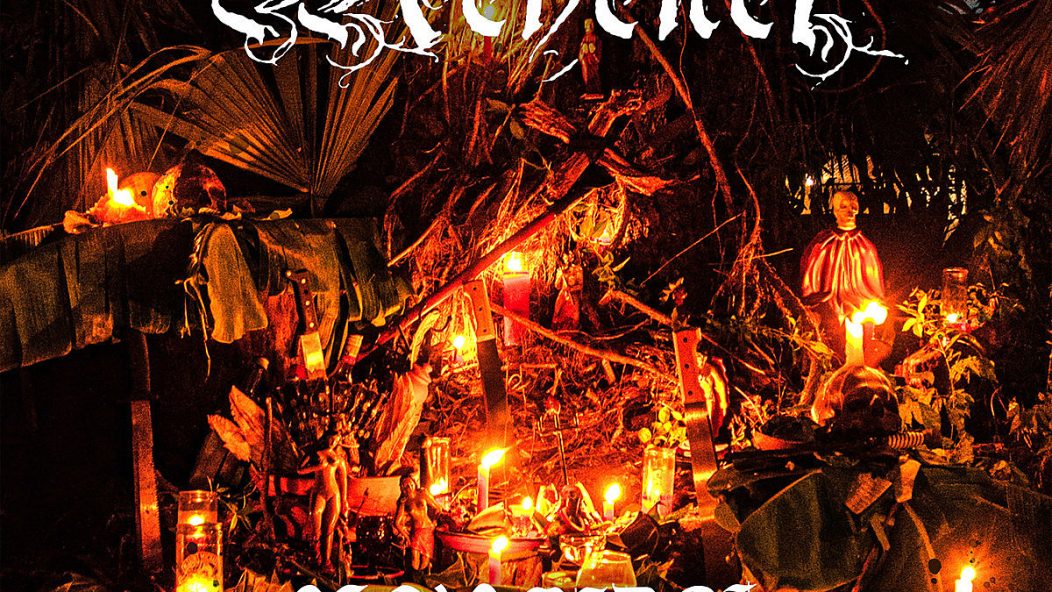
Mehenet Makes a Black Metal Offering to "Dona Sete" (Early Track Stream)
Music runs in the veins of New Orleans: walk a few minutes in the French Quarter on any given day and you’ll pass a staggering number of buskers, bands, and parades adding their melodies to the city’s sound. Compared to other cities across the United States, New Orleans stands out for that reason and more: colonization plus the slave trade resulted in a complex brew of cultures and religions, as well as its music scene being even more varied than most: it’s the birthplace of jazz, of course, but also the home of sludgecore.
Mehenet is another band the city can proudly claim: these black metal practitioners have roused a fiery storm of black metal that’s deeply connected to the city’s spirit. Their new album Ng’ambu presents a celebration of both black metal and New Orleans that hits on a spiritual level. The nine-minute opening track “Dona Sete,” which you’ll find streaming below, starts off with a series of praise and greetings that quickly transforms into overpowering, reverent black metal.
…
…
Designed as a hymnal for the praise of spirits, Ng’ambu draws from Quimbanda, an Afro-Brazilian religion that found its way to New Orleans like so many others and which the band members have participated in. “Dona Sete,” as the band explains further below, is the opening invocation meant to, above all else, give praise. After an introductory litany backed by hypnotically rhythmic hand drums, things take on an unearthly gleam: as a scrawling guitar line doodles out a melody, the drumming steadily escalates into an avalanche, eliminating any lingering tranquility and heralding the arrival of unseen (but not unfelt) presences. Then comes the black metal might: always a shade of dissonance away from ever feeling rotely evil or triumphant, these meaty riffs lurch along with an uncanny tilt. Lengthy as it is, the song never settles down: jumping from frantic blast beats to resolute, mid-tempo pounding, “Dona Sete” calls out to spirits with fervent vigor.
Though the inclusion of ambient urban sound later in the album and traditional instrumentation helps tie Ng’ambu back to the city, the connection feels deeper than that. Hailing from a city that has managed to hold onto much of its history and culture despite fires and floods, Mehenet’s vivid and authentic take on ritualistic black metal claws back the concept from the throngs of tepid imitators, paying tribute to a slice of New Orleans’ spirituality at the same time.
The band comments:
Dona Sete throbs with Life and Desire. She is the one who arrives full of lust and ambition, with a critical discernment, with absolute command; a destroyer of limitations.
We consider this song our flagship for the new album because she represents the Queen of our work and is the animating fire embroiling underneath the rest of the album. We introduce the world using more traditional drumming and salutes rather than straight forward blast beats. Lyrically we salute our godfather, past mothers and fathers, the house, and of course our own spirits in general. In the first couple of verses we pay homage to
previous well known pontos cantados (praise songs – invocations) and then move on to our own reflections on the manifesting force Dona Sete brings. We specifically felt called to draw attention to Pomba Gira as she relates to the Red Sun, Tukula. Pomba Gira is the animating and spinning fire at the crossroads of eternity. While we might see four distinct moments in time and in our life; where we might celebrate the mysteries of distinct peak expressions of death and renewal; she arrives with the continuous snail spiral which eternally recurs about the whole of the dikenga.With Dona Sete, by her força, what is dead comes back, what was defeated is now crowned and conquering, what is Woman becomes ineffable and yet somehow remains intensely visceral. In the previous album we meditated on the dead, on dead mysteries, on a dying history, on the neglected and the desire for revolution. In this album the dead are fed and awakened and given new purpose. Here we have the power to make silence shake and darkness enlighten. The dead are not morbid – they laugh as their bones are stirred. They are people of a very quiet place. They do not possess us with nostalgic memories. They have come to manifest new possibilities, to challenge our assumptions and our self impositions. They have given themselves in service to new life, to new struggles, to new choices. They will open roads for some and they will definitely close the roads for others. Dona Sete stands solid in her power with the adulation of many. Where do we stand with her? Are we with the dead or the living? Or are these one throbbing heart, the systole and diastole of our desires for continuance and agency. Salve!
…
Ng’ambu releases September 10th, 2021 via Gilead Media (CD) and Stygian Black Hand (cassette).











